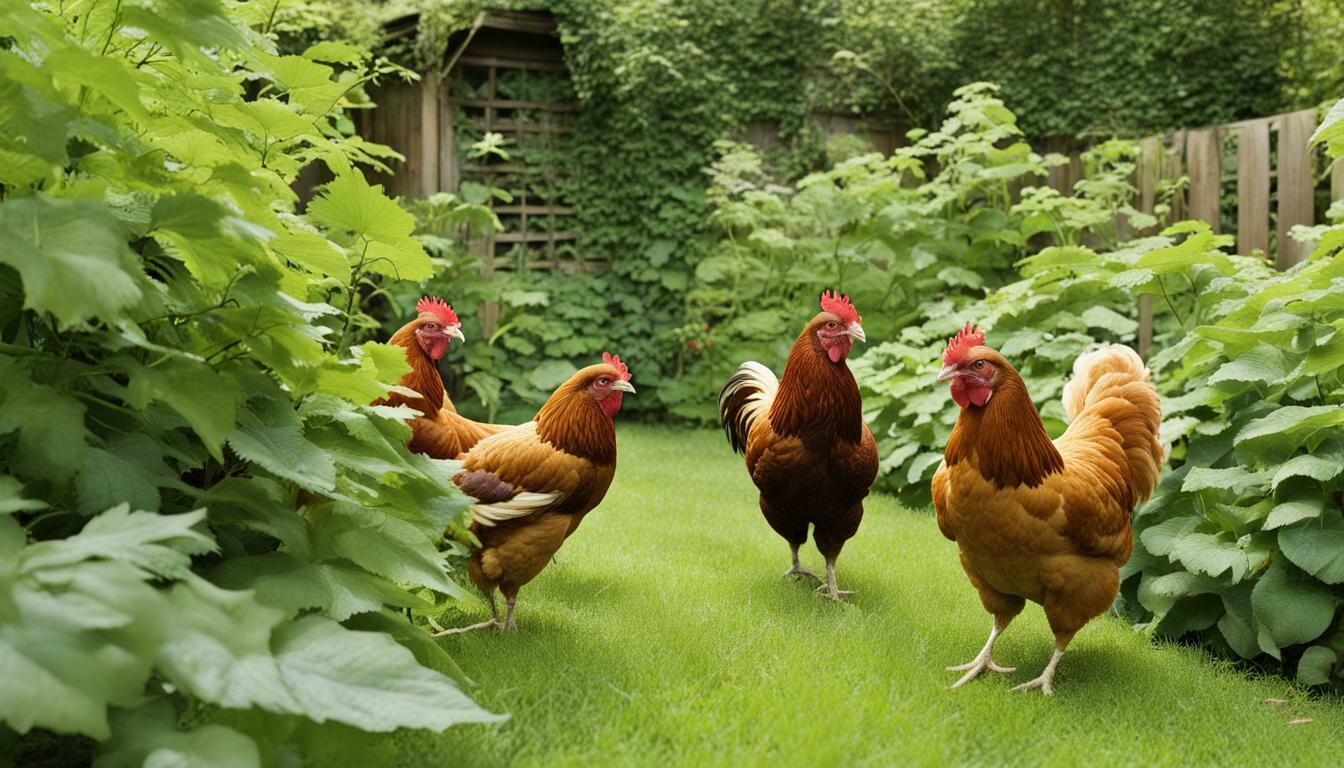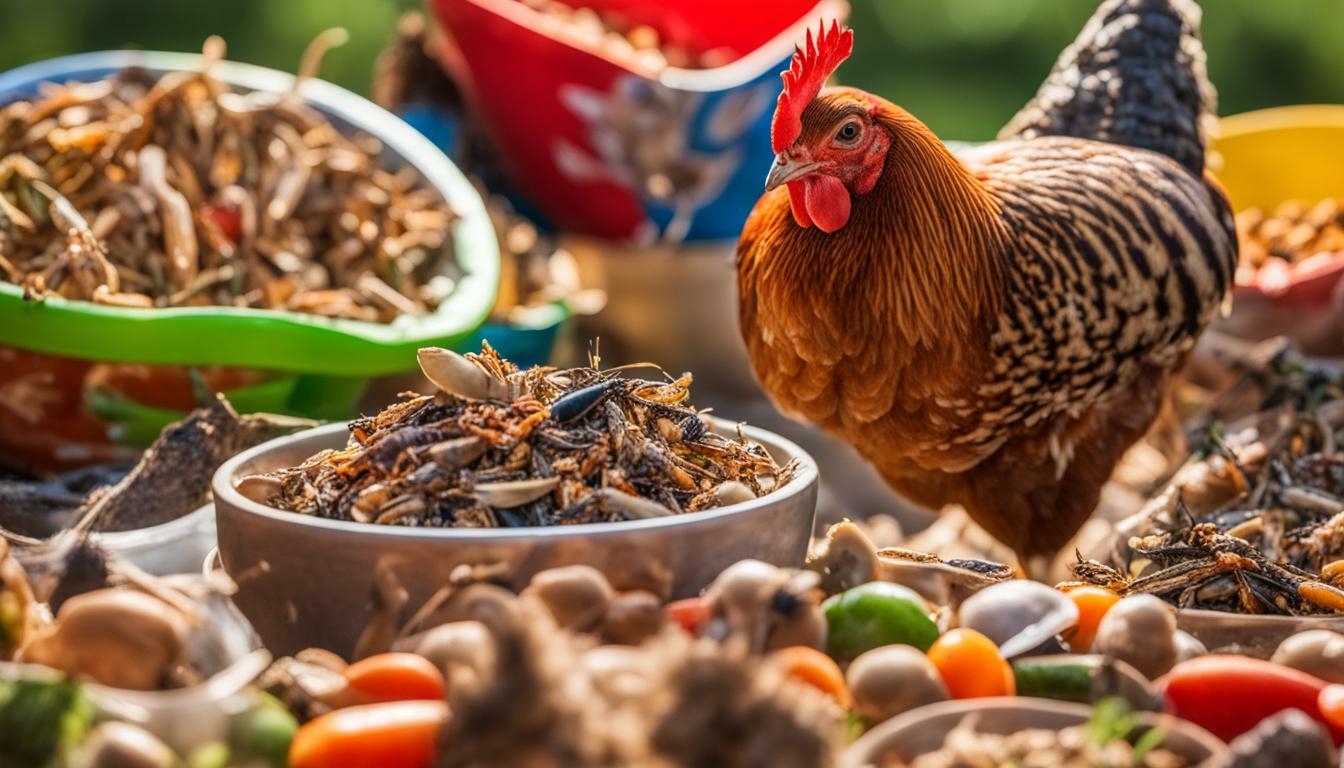Can Chickens Eat Kimchi? Find Out the Surprising Answer!

Table of content:
- Is Kimchi Safe for Chickens?
- Benefits of Feeding Chickens Kimchi
- Can You Feed Chickens Spicy Kimchi?
- Will Kimchi Improve Chicken Digestion?
- Do Chickens Like the Taste of Kimchi?
- Nutrients in Kimchi that Benefit Chicken Health
- How Much Kimchi Should You Feed Chickens?
- Should Kimchi Be a Daily Treat or Occasional Supplement?
- Feeding Kimchi to Chickens
- Are There Any Potential Risks of Feeding Chickens Kimchi?
- Final Thoughts
Kimchi is a traditional Korean side dish made from fermented vegetables like napa cabbage, radish, scallions, and spices. The fermentation process gives kimchi unique probiotic properties that can offer potential health benefits.
Many chicken owners wonder if their backyard chickens can eat kimchi too. The answer is yes, chickens can eat kimchi in moderation as part of a balanced diet.
Is Kimchi Safe for Chickens?
Kimchi is safe for chickens to eat. The fermented vegetables and active probiotic cultures in kimchi are perfectly fine for chickens to digest.
The main safety concern would be the salt and spice content. Store-bought kimchi and some homemade recipes have high sodium levels. Spicy peppers like Korean red pepper powder also give kimchi its signature heat.
Too much salt or spicy peppers may cause digestive upset in some sensitive chickens. This is why kimchi should only be fed occasionally and in moderation.
To be extra safe, make or buy a “chicken-friendly” kimchi with reduced salt and spice. You can also rinse kimchi to remove some excess saltiness.
Benefits of Feeding Chickens Kimchi
Here are some of the main benefits chickens can gain from eating fermented kimchi:
- Probiotics – The lactic acid bacteria and yeasts that ferment kimchi provide a natural source of probiotics. These healthy gut microbes aid digestion and improve immunity in chickens.
- Nutrition – Kimchi offers vitamins, minerals, and antioxidant nutrients from the vegetables. The fermentation process may even make these nutrients more bioavailable.
- Gut health – The probiotics in kimchi support the beneficial microflora in a chicken’s digestive system. This improves gut function and overall health.
- Appetite and egg production – Small amounts of fermented feeds like kimchi can stimulate appetite and egg production in chickens. The taste and probiotics induce them to eat more.
- Flavor and variety – Chickens enjoy new and intense flavors. The tangy, sour taste of kimchi is a nice change of pace from regular chicken feed.
Can You Feed Chickens Spicy Kimchi?
Most commercial kimchi and authentic recipes use generous amounts of Korean red pepper powder or flakes for heat. However, chickens do not tolerate spicy foods well due to their sensitive digestive systems.
To allow chickens to safely enjoy the benefits of kimchi, it’s best to eliminate or significantly reduce the amount of spicy peppers used.
You can make a very mild “chicken kimchi” using just a pinch of red pepper flakes. Or leave out the spicy peppers completely.
The fermented flavor will still come through nicely and provide the probiotic cultures chickens need without upsetting their stomachs with too much spice.
Will Kimchi Improve Chicken Digestion?
Yes, the live probiotic cultures in kimchi can greatly improve digestion and gut function in chickens.
The natural probiotics in kimchi populate the gut with beneficial bacteria like Lactobacillus. These microbes help:
- Break down and absorb nutrients from food.
- Regulate digestion and prevent gastrointestinal disease.
- Strengthen the immune system against pathogens.
- Produce vitamins and digestive enzymes.
Feeding small amounts of kimchi introduces more of these healthy probiotics into a chicken’s digestive tract.
Over time, this has a positive influence on gut ecology and digestion. It may also reduce chick morbidity and increase productivity in backyard chicken flocks.
Do Chickens Like the Taste of Kimchi?
Most chickens love the tangy, fermented taste of kimchi. It has intense flavors unlike their usual feed and provides some beneficial variety.
Some people describe kimchi as having a “sour cabbage” flavor. The fermented taste results from lactic acid, acetic acid, caproic acid, and other compounds produced by the microbes.
This gives kimchi a distinct tart, sour, and umami flavor profile. The seasoned vegetables and fermented taste make kimchi enticing for chooks.
For picky chickens that are uncertain about kimchi at first, try mixing a little into their feed to encourage a taste. Once they acquire the taste, they will likely eat kimchi with relish.
Nutrients in Kimchi that Benefit Chicken Health
Kimchi provides a range of vitamins, minerals, and phytochemicals that offer nutritional benefits:
- Vitamin A – Supports immunity and reproductive health.
- Vitamin K – Needed for blood clotting.
- B Vitamins – Important for energy metabolism.
- Iron – Required for blood and egg health.
- Calcium – Essential for bone strength and eggshell quality.
- Magnesium – Supports enzyme functions.
- Phosphorus – Key for energy production.
- Potassium – Needed for water balance and nerve transmission.
- Fiber – Improves digestion and gut health.
- Antioxidants – Reduce cell damage by free radicals.
The fermentation process may also make these nutrients more bioavailable. Overall, kimchi offers a nutritious supplement to a balanced chicken diet.
How Much Kimchi Should You Feed Chickens?
Chickens should eat fermented feeds like kimchi in moderation. As a treat or supplement, chickens can eat around 1-2 tablespoons of kimchi 1-3 times per week.
Monitor your chickens after first introducing kimchi. Reduce the amount if any chickens show signs of digestive upset or diarrhea.
Never replace regular, complete feed with kimchi. The proper daily diet for chickens should still consist mainly of high-quality commercial feed or well-balanced homemade ration that meets all nutritional requirements.
Think of kimchi as a probiotic and flavorful supplement – not a dietary staple. Free-choice feeding is not recommended since overeating risks health issues in chickens.
Should Kimchi Be a Daily Treat or Occasional Supplement?
Most chicken experts recommend feeding kimchi in moderation as an occasional supplement, not daily. Here are some guidelines on kimchi frequency:
- As a weekly treat – Offer 1-2 times per week.
- As a bi-weekly supplement – Feed every other week.
- For digestive support – Small daily portions for chickens with gut problems.
- During molting – Increase frequency to support stress periods.
Monitor the chickens after feeding kimchi and adjust the amounts and frequency based on their tolerance, health status, productivity level, and life stage.
The key is moderation. Kimchi provides benefits as a supplemental feed, but should not become a big daily part of a chicken’s diet.
Feeding Kimchi to Chickens
You can serve kimchi to backyard chickens in a few quick, easy ways:
- Plain – Scoop out the kimchi and place servings in a bowl, feeder, or directly on the ground.
- Mixed In – Stir a few spoonfuls of kimchi into whole feed or grain rations.
- Sprinkled Over – Lightly sprinkle kimchi pieces over the top of feed.
- Fermented Feed – Add a kimchi puree slurry to chicken feed and allow it to ferment.
Make sure each chicken gets a portion and watch for bossy birds that try to gobble up all the tasty kimchi themselves. It works well to feed kimchi as the last supplement after their main feed to avoid waste.
Are There Any Potential Risks of Feeding Chickens Kimchi?
Feeding appropriate amounts of fresh, properly fermented kimchi is generally safe for chickens. However, here are a few potential downsides to keep in mind:
- Digestive problems – Too much kimchi may cause loose droppings or diarrhea. Start with small amounts.
- Dehydration – The high salt content acts as a diuretic. Ensure plenty of fresh water is available at all times.
- Food safety – Use freshly fermented kimchi and avoid feeding spoiled batches.
- Reduced feed consumption – Chickens may fill up on tangy kimchi and eat less nutritionally balanced feed.
- Unbalanced diet – Relying too heavily on high-salt fermented feeds can lead to nutritional deficiencies over time.
- Inappropriate fermentation – Kimchi spoiled by undesirable microbes can make chickens sick.
Following proper feeding guidelines minimizes the risks. Overall, the potential benefits of fresh, homemade kimchi as an occasional supplement outweigh any risks for backyard chickens.
Final Thoughts
With its intense flavors and probiotic content, kimchi is an excellent supplement to feed backyard chickens in moderation. Follow proper fermenting methods and store kimchi correctly in the refrigerator to avoid spoilage.
Start by introducing small servings of mild, low-salt kimchi just 1-2 times per week. Adjust amounts based on the chickens’ preferences. Serve kimchi as a treat or mix it into feed for variety.
While too much kimchi can cause issues, appropriate amounts provide probiotics, nutrients, and stimulation that support chicken health, digestion, and productivity. Just remember moderation and balance when feeding chickens fermented foods like kimchi.
Welcome. I’m Adreena Shanum, the proud owner of this website, and I am incredibly passionate about animals, especially poultry. I founded adreenapets.com as a labor of love, stemming from my desire to share my knowledge and experiences with poultry enthusiasts worldwide.




